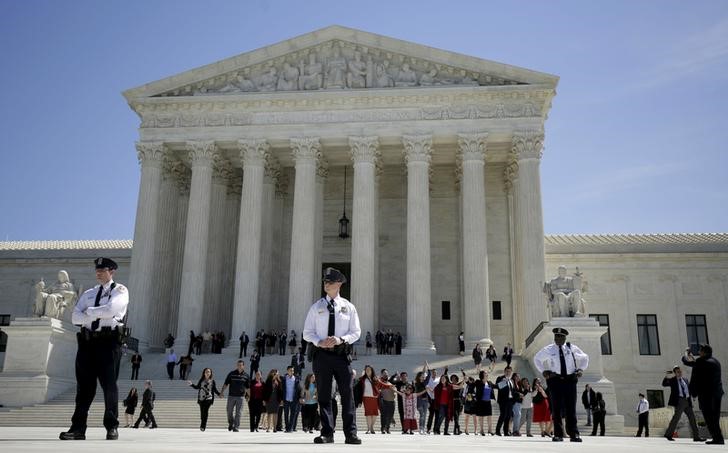Immigration in limbo

Immigration activists join hands after the U.S. Supreme Court heard arguments in a challenge by 26 states over the constitutionality of President Barack Obama’s executive action to defer deportation of certain immigrant children and parents who are in the country illegally, in Washington April 18, 2016. REUTERS/Joshua Roberts
By Lawrence Hurley
WASHINGTON (Reuters) – The U.S. Supreme Court on Thursday dealt President Barack Obama a harsh defeat, splitting 4-4 over his plan to spare millions of immigrants in the country illegally from deportation and give them work permits, leaving intact a lower-court ruling blocking the plan.
The court, with four conservative justices and four liberals, appeared divided along ideological lines during oral arguments on April 18 in a case brought by 26 states led by Texas that sued to block Obama’s 2014 executive action on immigration that bypassed Congress.
The 4-4 ruling was possible because there are only eight justices following February’s death of conservative Antonin Scalia.
The states argued that Obama overstepped the powers granted to him by the U.S. Constitution by infringing upon the authority of Congress.
“Today’s decision keeps in place what we have maintained from the very start: one person, even a president, cannot unilaterally change the law. This is a major setback to President Obama’s attempts to expand executive power, and a victory for those who believe in the separation of powers and the rule of law,” said Texas Attorney General Ken Paxton, a Republican.
Republican U.S. House of Representatives Speaker Paul Ryan said the ruling “makes the president’s executive action on immigration null and void.” Ryan described the decision as a “major victory in our fight to restore the separation of powers.”
The Constitution assigns certain powers to the executive, legislative and judicial branches of the federal government.
Obama’s plan was blocked by lower courts and never went into effect.
Obama’s plan was tailored to let roughly 4 million people – those who have lived illegally in the United States at least since 2010, have no criminal record and have children who are U.S. citizens or lawful permanent residents – get into a program that shields them from deportation and supplies work permits.
The court did not issue a ruling on the merits of the main legal question. Therefore, its action set no legal precedent to bind future presidents. The decision indicates that any major immigration policy change that would address the long-term situation of the estimated 11 million people in the country illegally would have to be enacted by Congress.
This was not the first time that the Supreme Court determined the fate of an important Obama initiative. The justices in 2012 and 2015 issued high-profile rulings preserving his signature healthcare law that Republicans have long fought.
The case was viewed as an important test of the limits of presidential powers and came near the end of the Obama presidency that has been defined by unceasing fights with Republicans in Congress and in state capitals who have fought countless initiatives of the president.
The issue of illegal immigration has featured prominently in the campaign ahead of the Nov. 8 U.S. presidential election. Donald Trump, the presumptive Republican nominee, has called for deportation of all immigrants in the United States illegally – most of them from Mexico and other Latin American countries.
After the states filed suit and shortly before Obama’s plan was to go into effect last year, a federal judge in Texas blocked it in February 2015. The New Orleans-based 5th U.S. Circuit Court of Appeals upheld that decision in November.